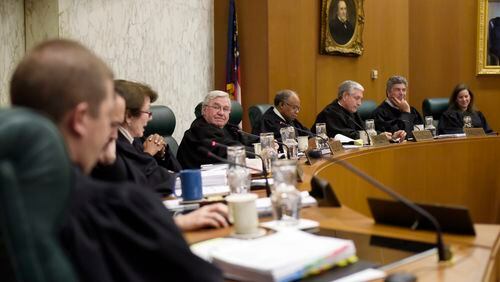Gov. Nathan Deal is weighing his next appointments to Georgia’s Supreme Court. He should pick women. Unless he does, soon every member of Georgia’s highest Court will be male.
The current two vacancies on the Court are the result of the appointment of Justice Britt Grant to the Atlanta-based 11th Circuit Court of Appeals and the pending retirement of Chief Justice Harris Hines. Gov. Deal now must choose two new justices from a shortlist provided by the Judicial Nominating Commission. He is expected to make his first appointment later this month.
The nine-member Georgia Supreme Court currently has only two women justices, and they are both leaving. Justice Carol Hunstein’s long and esteemed 26-year tenure on the Court will end later this year. She decided not to seek reelection, and Judge John Ellington has been elected to fill her seat. The only other woman, Justice Grant, is joining the 11th Circuit, and Gov. Deal now has the opportunity to select her replacement.
The symbolism of an all-male Court would be terrible. Georgia would be the only state in the nation without any female judges on its highest court. (Iowa had none, but its governor recently appointed a new female justice.) Regrettably, only three women have served on the Court since it was formed in 1845. Because the Georgia Supreme Court decides cases involving the most important, life-impacting issues for Georgians (51 percent of whom are women), women must be included in making these decisions. For example, the Court hears appeals from civil cases involving adoption, restraining orders, and healthcare; the Court hears appeals from criminal cases where women are both perpetrators and victims, including domestic-violence cases. We’ve moved beyond the time when decisions on these topics can be made by a group of nine men.
In the past few years, public companies have decided that greater diversity in their boardrooms results in better decisions. Studies have shown that companies with at least one woman on the board outperform their competitors. And, when you think about it, isn’t it obvious that people with different experiences may be able to share insights that others miss? If diverse viewpoints are important to Coca-Cola, Delta, and Home Depot, then they are also important to Georgia’s highest court.
Gov. Deal has a plethora of qualified, accomplished female lawyers from which to choose. The roster of qualified female candidates is long and gets longer every year. Impressive women lawyers work in all areas of the law — from private law firms to government agencies, from non-profits to in-house counsel at Georgia’s top companies — and they are available to fill these vacancies. More women lawyers join the ranks every day. Nationwide, the majority of law-school students are women. This trend holds at Georgia’s top law schools, where roughly half the members of the recent graduating class were women.
With fingers crossed, five women are on Gov. Deal’s shortlist. Appointing at least one deserving women lawyer to Georgia’s highest court is a must, and appointing two would show that Georgia means business about the advancement of women. Make Georgia proud, Gov. Deal!
The authors are lawyers at law firm Morris, Manning and Martin LLP. Seslee Smith is a partner in the firm’s litigation department. Anthony DeCinque is an associate who practices appellate law and commercial litigation.






